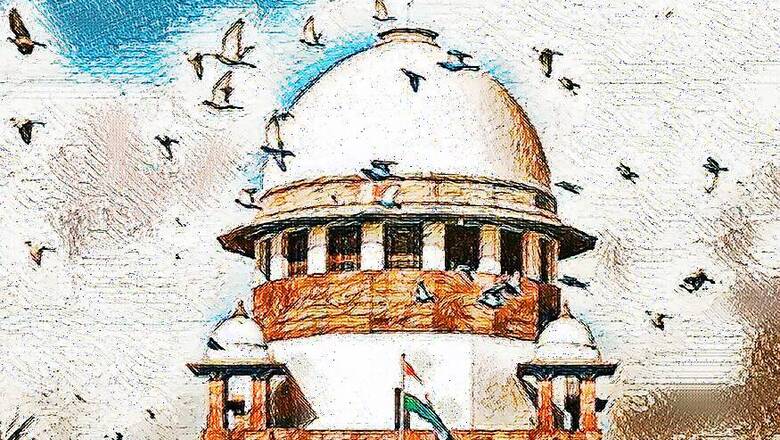
views
The judgment of the five-judge bench has yet again established the Supreme Court as one of the true saviours of democracy, the other being our Parliament.
By refusing to bar politicians with pending criminal charges from contesting elections while urging the Parliament to draft a legislation disqualifying such politicians, the Supreme Court has upheld the doctrine of separation of powers which forms part of the basic structure of our Constitution.
It has also given a true meaning to the rule that “court declares the law…the parliament makes the law…” as observed by Justice R F Nariman in this judgment.
The two aspects germane to the issue are first, dealing with pending criminal cases against politicians while the other, relates to those convicted for a criminal case by a court of law.
The latter is almost settled now in as much as such politicians are disqualified immediately upon conviction, unless the same is stayed by an appellate court, as ruled by the Supreme Court in the case of Lily Thomas v. Union of India on 10th July 2013 while striking down Section 8(4) of the Representation of the People Act (RP Act), which allowed elected representatives three months to appeal against the order of conviction.
Such politicians also stand barred from contesting any election for a period of six years from the date of their release post-conviction as provided by the provisions of the RP Act.
It is the first aspect, regarding politicians with pending criminal cases that requires consideration. This aspect is largely influenced by the question of false cases arising out of political vendetta. Even the Supreme Court while pronouncing its verdict today, took a conscious note of the same and directed that the Parliament should also consider the issue of false cases being filed against politicians.
It is well known, that people in political life have a number of adversaries ranging from those in opponent political parties to those within their own parties and still those within their electoral constituencies.
Thus, the politicians are comparatively more susceptible to false criminal cases by those who want to settle their political or personal scores. I am glad that the Supreme Court in their collective wisdom, have left this question of disqualification on the ground of a pending criminal case open, to be legislated upon by the Parliament.
It was desirable, also for the reason, that justice is not only about deciding for and against somebody but it is largely about fairness. It will be grossly unfair to debar someone who has made tireless efforts for years towards public service from contesting elections, only because there is an FIR against him or he has been chargesheeted by the police, which may not stand scrutiny at the trial and ultimately result in his acquittal.
Given the vagaries of our criminal justice system, this entire process has many shortcomings beside being time consuming and only on this basis, if a person is debarred from contesting elections, it may tantamount to gross injustice to him.
It was also for this reason that the Supreme Court has held in the well-known case of State of Haryana v. Bhajan Lal that an FIR is liable to be quashed if it is found to have been maliciously instituted with an ulterior motive for wreaking vengeance on the person accused of a crime.
It may sound howsoever true, to be speaking from the side of politicians accused of criminal cases but fairness is not about one-sided approach, which is, the very antithesis of justice and democracy.
However, it is equally important to put a reasonable check on politicians with criminal background to become representatives of people and can certainly not be left unattended. Doing so in fact, would be dangerous or rather fatal to the very spirit of democracy. It was rightly observed by the Supreme Court in their judgment today that, “…it is one thing to take cover under the presumption of innocence, but it is another to allow politics to be smeared by criminal stain…”
I completely agree with directions of the Supreme Court to political parties to publish records of criminal pasts of the candidates on their websites and publicise it to ensure that the voters make an informed choice.
This is consistent with the established practice of the Election Commission which, in accordance with the provisions of the RP Act, requires every candidate to state on oath, the details of criminal cases pending against him/her by furnishing an affidavit at the time of filing nomination papers to contest an election to a Legislative Assembly or the Parliament.
Not giving complete information related to criminal cases, tantamount to concealment of facts which itself constitutes serious offence, not only under the RP Act but also under several provisions of the penal code.
In fact, such a candidate may be held liable for cheating the voters of a particular constituency of misleading them to believe that he/she did not have any criminal case pending against him/her and inducing them to vote for such a candidate in the elections. The nomination papers along with the said affidavit filed by a given candidate forms part of public documents and can be accessed by any member of the public.
Nevertheless, given the state of political affairs in our country that, country eagerly awaits the decision of the Parliament in this regard. It is essential for the Parliament to bring a comprehensive law at the earliest, to instil confidence in the minds of general public about the leaders whom they elect and send to the august Houses of Parliament and Legislative Assemblies.
They must be free of any kind of criminal blemish or taint. At the same time, the legislation should be one, which provide adequate safeguards against false cases and false prosecution of honest politicians.
(The author is a senior advocate in the Supreme Court of India. Views expressed are personal)

















Comments
0 comment